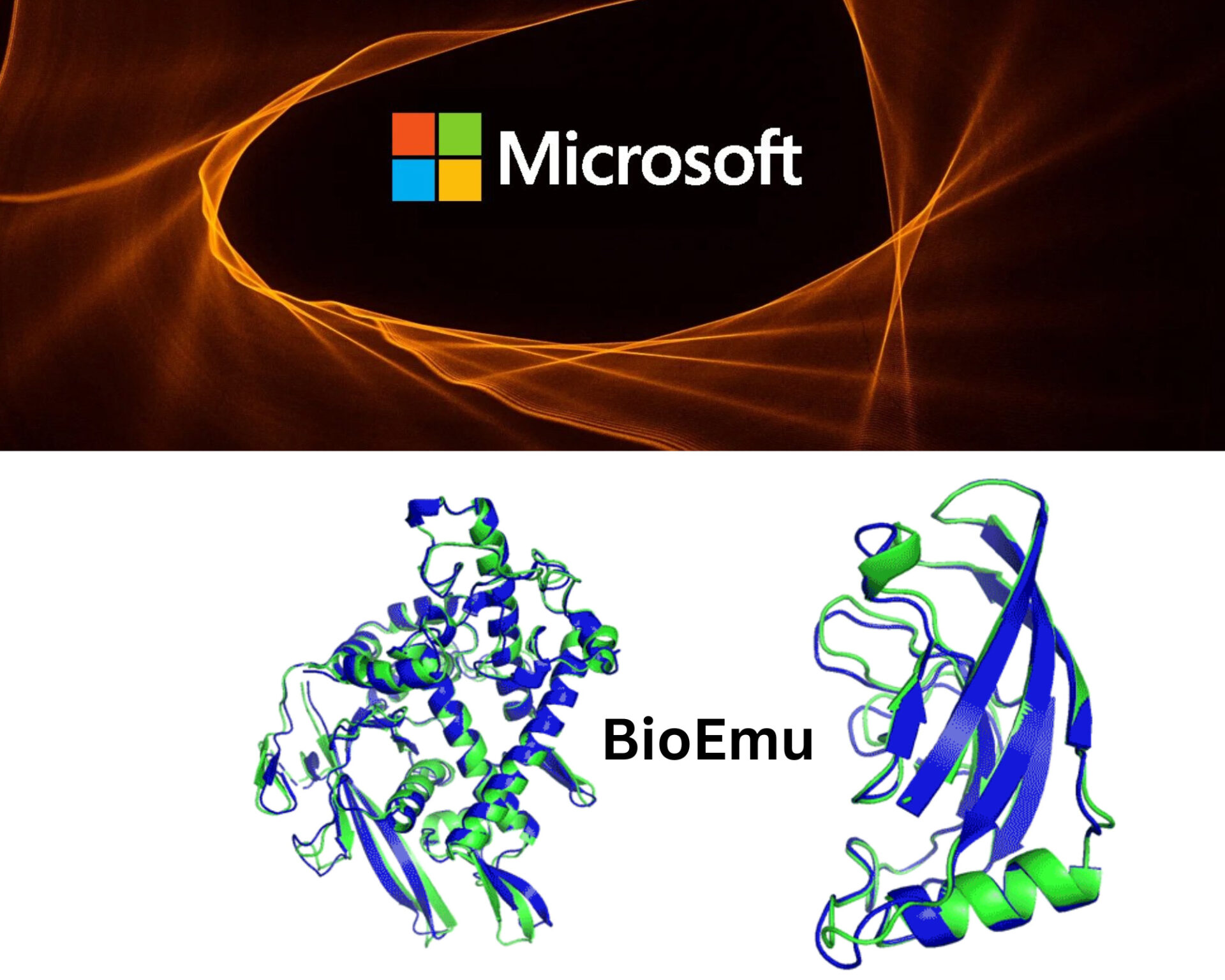In a groundbreaking announcement that could reshape the pharmaceutical industry, Microsoft CEO Satya Nadella unveiled BioEmu, an artificial intelligence system designed to accelerate drug discovery by decades. This innovative AI tool promises to transform how scientists understand protein behavior, potentially bringing life-saving medications to market faster than ever before.
What is Microsoft BioEmu and Why Does It Matter?
BioEmu (Biomolecular Emulator-1) represents a significant leap forward in computational biology. This deep learning model can generate thousands of protein structures per hour using just a single graphics processing unit (GPU), delivering insights that would traditionally require years of complex computer simulations.
“Understanding protein motion is essential to understanding biology and advancing drug discovery,” explained Satya Nadella in his announcement. “Today we’re introducing BioEmu, an AI system that emulates the structural ensembles proteins adopt, delivering insights in hours that would otherwise require years of simulation.”
The Science Behind BioEmu: How It Works
Advanced Molecular Dynamics Simulation
BioEmu integrates over 200 milliseconds of molecular dynamics (MD) simulations with static structures and experimental protein stability data. The system uses novel training algorithms to capture diverse functional motions, including:
- Cryptic pocket formation: Hidden binding sites that could be targeted by future drugs
- Local unfolding: Temporary structural changes that affect protein function
- Domain rearrangements: Large-scale movements within protein structures
Unprecedented Accuracy and Speed
The AI system demonstrates remarkable precision, predicting relative free energies with 1 kcal/mol accuracy compared to millisecond-scale molecular dynamics and experimental data. This level of accuracy, combined with its speed, makes BioEmu a game-changer for researchers worldwide.
Real-World Applications in Drug Discovery
Accelerating Pharmaceutical Research
Traditional protein analysis methods require extensive computational resources and time. BioEmu’s ability to complete simulations in hours rather than years could dramatically reduce the time it takes to bring new medications to market. This acceleration is particularly crucial for:
- Cancer treatment development: Understanding how proteins involved in cancer behave
- Infectious disease research: Analyzing pathogen proteins to develop targeted therapies
- Rare disease medications: Making research economically viable for smaller patient populations
Cost-Effective Research Solutions
By reducing computational requirements from years to hours, BioEmu makes advanced protein research accessible to smaller research institutions and pharmaceutical companies. This democratization of cutting-edge technology could lead to more diverse and innovative drug development approaches.
The Role of Proteins in Human Health
Proteins serve as the fundamental building blocks of life, performing countless essential functions in our bodies. From forming muscle fibers to protecting against diseases, proteins are involved in virtually every biological process. Understanding how these molecules move and change shape is crucial for:
- Designing more effective medications
- Understanding disease mechanisms
- Developing personalized treatment approaches
- Creating targeted therapies with fewer side effects
Technical Breakthrough: Structural Ensembles
One of BioEmu’s most significant innovations is its ability to predict structural ensembles – the different shapes and conformations that proteins can adopt. This capability addresses a longstanding challenge in molecular biology, as proteins constantly shift between different forms while performing their functions.
Predicting Cryptic Binding Pockets
BioEmu’s standout feature is its ability to identify “cryptic” binding pockets – hidden spots on proteins that could serve as targets for future drugs. These hard-to-detect structural changes often hold the key to developing more effective treatments for complex diseases.
Microsoft’s AI for Science Initiative
BioEmu represents the latest achievement from Microsoft Research’s AI for Science team, demonstrating the company’s commitment to applying artificial intelligence to solve real-world scientific challenges. This initiative focuses on:
- Accelerating scientific discovery through AI
- Making advanced computational tools accessible to researchers
- Bridging the gap between theoretical research and practical applications
Industry Impact and Future Implications
Transforming Drug Development Timeline
The pharmaceutical industry typically requires 10-15 years and billions of dollars to bring a new drug to market. BioEmu’s ability to rapidly analyze protein behavior could significantly reduce this timeline, potentially saving lives and reducing healthcare costs.
Competitive Advantage in Biotechnology
Organizations that adopt BioEmu early may gain substantial competitive advantages in drug discovery. The system’s efficiency could enable more experimental approaches and increase the likelihood of breakthrough discoveries.
Peer Review and Scientific Validation
The research behind BioEmu has been published in the prestigious journal Science, providing scientific credibility and peer validation. The publication details how the system achieves:
- Strong correlation scores above 0.6 on large test datasets
- Prediction errors of less than 1 kcal/mol
- Successful emulation of equilibrium distributions of molecular dynamics simulations
The Future of AI in Healthcare
BioEmu represents just the beginning of AI’s potential in healthcare and drug discovery. As the technology continues to evolve, we can expect:
- More sophisticated protein analysis capabilities
- Integration with other AI-powered research tools
- Broader applications in personalized medicine
- Reduced costs for pharmaceutical research and development
Conclusion
Microsoft’s BioEmu AI system marks a pivotal moment in computational biology and drug discovery. By dramatically reducing the time required to understand protein behavior, this technology could accelerate the development of life-saving medications and make advanced pharmaceutical research more accessible worldwide.
As we move forward, the integration of AI tools like BioEmu into pharmaceutical research pipelines promises to usher in a new era of rapid, cost-effective drug discovery. For patients waiting for treatments and researchers working tirelessly to find cures, BioEmu represents hope for faster, more effective solutions to some of humanity’s most pressing health challenges.
The future of medicine is increasingly intertwined with artificial intelligence, and Microsoft’s BioEmu is leading the charge toward a world where breakthrough drugs can be discovered and developed in record time.

